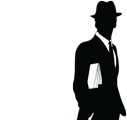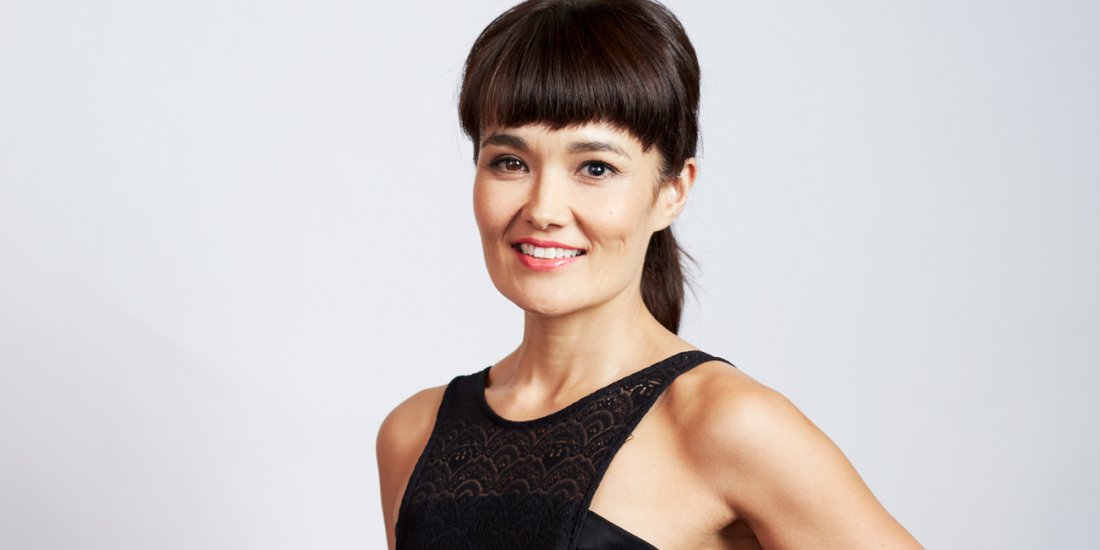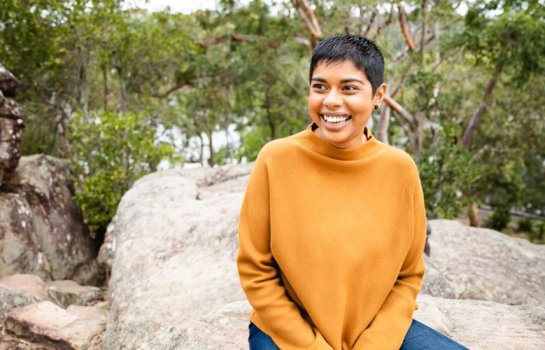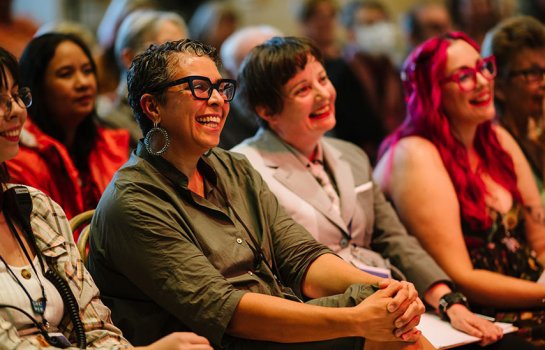Yumi Stynes, author and broadcaster, Brisbane Writers Festival
There’s nothing like feeling slapped by a brilliant sentence ...
Yumi Stynes might be one of the busiest people in Australian media. Not only does she pop up on our television screens often, her voice can be heard on podcasts and her writing can be spotted on bookshelves across the country. On top of that, she’s a mother of four. Yumi has made time in her loaded itinerary to pop up to Brisbane for several appearances at this year’s Brisbane Writers Festival – appearing on a variety of panels discussing everything from music to consent. We caught up with Yumi ahead of the festival to chat about her work, the joys of reading and how she finds time for herself …
Throughout your career you’ve worn many hats, including writer, radio host, podcaster and television presenter. What do you find most creatively stimulating and freeing about being able to navigate between different mediums?
Sometimes I think I’m like Kiki, the young witch in the animated movie Kiki’s Delivery Service. Early on in the film she is learning to fly. She meets another young witch who can fly and read fortunes and make love predictions, and it’s fortune-telling that this other witch spins off into a career. But Kiki can’t do anything that sophisticated. She can just fly, and barely that some days. So she delivers food and gifts around town for a job.
In my work I see other witches who do amazing magic with words – people like Melbourne author Sarah Krasnostein who has such breathtaking gifts of storytelling and takes on stunning concepts and performs these agonising writerly feats. Sometimes I finish a paragraph she’s written and I gasp and throw the book at the wall. Because over here I am just trying not to fall off my broomstick! But I’ve come to be pretty okay with that. Because my job is to make things really easy to understand. In radio and podcasting, my job is to allow other people’s stories to flow past me while offering minimal interruption and maximum encouragement. And in writing my guidebooks, my job is to get in the ears of young kids before they tune out. It might look easy, but it’s my jam, and I dig it.
Earlier this year you released a new book called Welcome to Your Boobs, which is the latest in a series of books you’ve penned alongside Dr Melissa Kang. What initially inspired the two of you to team up on this series and what would you say has been the most rewarding aspect of the experience?
Dr Melissa is, quite frankly, a legend, and I am delighted just to be in the same room as her. She was Dolly Doctor for more than 20 years and there is not a thing about the adolescent body that she doesn’t know. She and I had been connected through my podcast and my publisher Marisa, who has sparkly eyes, saw the connection and was wagging her tail furiously at us, saying, “You two need to write a book together!” We kicked around some ideas and I think mutually agreed that no one had ever written a book that was just about periods – about what to expect, how to manage it, and how it will feel – for the audience of young kids who actually need those questions answered.
It’s funny to see that when you’re nine, ten, 11 years old, people think you might not be able to ‘handle’ these concepts. So they withhold the information and hope kids don’t see blood on their undies until they can ‘handle’ the concept. And I guess when I say “It’s funny” I mean it’s actual, total bullshit. The Welcome to … books have gone on to be wildly successful. Feedback I get regularly is, “I wish I had this book when I was a kid.” The hardest one to write was Welcome to Consent, which finally spells out consent in ways that kids can really grapple with, internalise and apply in real life. When women tell me they wish they’d had the consent book when they were younger, there’s often a lot of unspoken pain inside that sentiment.
Last year you and Claudine Ryan released Ladies, We Need To Talk, a book that expands upon the topics and conversations that feature in your podcast of the same name. Both the book and podcast series look to ‘tear open the sealed section’ on life and tackle topics that have been largely under-explored and discussed. What is your approach to examining these topics in an insightful and entertaining manner, and does your method change when working in different formats?
Ladies, We Need to Talk was the surprise hit of the ABC podcasting department. It’s now been going for six years. The pact of the show is that if it’s hard to talk about it – if it hurts or shames – then we absolutely will talk about it. Time and again we discover that there are elements of women’s bodies that are used against us, that are considered shameful and treated as disgusting when they’re nothing more than a common biological function. So the show might start with: “You leak wee now that you’ve had kids? Really, really not unusual. Pretty standard, in fact. Now here’s what you can do about it.”
We realise that not every problem can be solved, but that humans all feel better about what’s going on when we can share and when we feel heard. So the podcast shows a terrific gentleness with people’s stories, handling them like newborn ducklings. The show is never about me, nor the theory nor the expert. It’s about regular people who have an experience they think is worth sharing.
Ladies, We Need to Talk became such a juggernaut that it needed its own book – and a whole book meant that medical, political and ethical concepts could be given space and air and diagrams, and that we could create a document where passages could be underlined and returned to (it’s difficult to underline a passage in a podcast). When a woman feels safe to share something that is really personal to her, that is wrapped up in trauma or delight, or hilarity or shame, she will speak in an entertaining way. There is no way she can’t. Women are yarn-spinners and bond-builders. The women who share their stories are the heroes of Claudine and my book.
You’ll be popping up all over this year’s Brisbane Writers Festival, both as a panel member and interviewer. Can you give us a brief rundown of the events we can catch you at and the topics you’ll be tackling?
I’ll be part of Pig City (May 3), How To Talk About Consent (May 6), Asian Women Let Loose (May 7) and My Life In Pop Culture (May 7), covering everything from Brisbane’s political and musical past with Andrew Stafford to urgent conversations about consent across generations and genders with Clementine Ford, Diana Reid and Andie Fox.
Are there any other events at the festival you’re excited to attend while you’re in town?
Yes, I am really excited to go and listen and learn at the talk Trans Bodies, Trans Lives (with essa may ranapiri, Nevo Zisin, Yves Rees and Rae White) and taking a Cuppa with an Elder with Aunty McRose Elu, which is a free event at the State Library.
As the media landscape diversifies and our methods of content consumption evolve, what would you say is the enduring allure and benefit of books and the written word?
Books have a lot to compete with these days, but there’s nothing like getting completely lost in a book, hallucinating it, living it, sleeping it and dreaming it. There’s nothing like feeling slapped by a brilliant sentence.
On the topic of the written word, are there any books in your reading list that you’d wholeheartedly recommend to everyone?
East, a cookbook by Meera Sodha. It’s vegan and vegetarian, skewed Indian/Asian and totally delicious. My poor kid had to read The Hag Seed by Margaret Atwood and I’d like to take this opportunity to implore school English Departments to choose books that make kids feel sexy and alive! They’re 17 – they don’t want to read the goddamn Hag Seed, I promise you! I really liked Sarah Wilson’s book This One Wild and Precious Life for talking with urgency about the climate crisis and what we can, in a practical and immediate sense, do about it right now. I loved Julia Baird’s Phosphorescence and David Attenborough’s witness statement called A Life on Our Planet. I’m listening to Audre Lorde’s series of essays and speeches called Sister Outsider and it has not dated one minute since it was written (published 1984).
You’ve got two cookbooks in your bibliography, so we know you’re a foodie! We’d love to know what your current culinary obsessions are when it comes to dining out cravings and cooking at home?
In Brisbane I always try to go to the restaurant Shushoku Maya at least once per visit. It’s mid-range Japanese, run by Japanese people with terrific authentic food. Very tasty! I took my Mum there last time we were visiting. They even have zero-alcohol beer, which every restaurant should serve. I also try to visit the West End Markets at least once per visit. Yes, we have brilliant markets in Sydney, but the produce and craft at West End Markets is vastly superior to what we have – and it’s cheaper (don’t take it for granted, my Brisbane friends! It’s really very good and you are lucky). I am obsessed with cooking beans, legumes and pulses at the moment because they’re better for the body and for the environment, and I am unfurling the magic that surrounds these foods when cooked properly with a combination of spices, intuition and creativity. It’s humbling to learn about culture through food and the possibilities are infinite.
In addition to your busy career, you’re also a mother of four. We’d love to know what your go-to method of self care is, to recharge and centre yourself when life gets hectic?
I suspect that a lot of authors are loners and I have really embraced that part of my soul likes being alone. I need it and I crave it and if I go too long without it I feel like I’m being strangled and get really pissed off. Like you say, I have four children so solitude is a luxury. But also, one of my favourite things in the world is discharging all my duties, getting everything cleaned and packed away in the kitchen, then having my two smaller kids sit on my lap while they watch TV. I don’t pay the TV the slightest attention! I just kiss their woolly fat heads and smell their hair and while my lap is being squashed by the weight of them I feel swollen with blessings and love. I’m also into running and so at least once per year I do a half-marathon. I want to be one of those sinewy old women, all leathery and nugget-brown, still running marathons in my 80s.
Yumi Stynes will be appearing at several events at this year’s Brisbane Writers Festival between May 3–8 – click here to browse the program and pick which events you’ll be checkin out!



